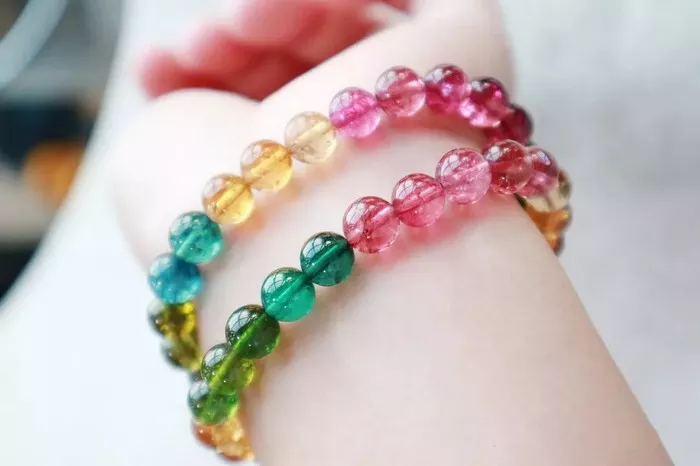Green tourmaline, a stunning gemstone known for its vibrant color and unique properties, holds a special place in the world of jewelry and gemology. This article aims to provide a comprehensive and detailed introduction to the origins, characteristics, and significance of green tourmaline from a professional perspective.
Origins of Green Tourmaline
Geological Formation
Green tourmaline, scientifically classified as a borosilicate mineral, belongs to the tourmaline group. Its formation is a result of complex geological processes that occur within the Earth’s crust. Specifically, tourmaline forms in igneous, metamorphic, and sedimentary rocks through the crystallization of molten magma or the alteration of existing rocks.
Geographical Distribution
Green tourmaline is found in various locations worldwide, each with its unique geological characteristics. Some of the most notable deposits include:
- Sri Lanka: Renowned for producing high-quality green tourmaline, Sri Lanka’s deposits are located in pegmatite veins within granitic rocks. These gems are often prized for their vivid color and transparency.
- Brazil: Brazil is another significant source of green tourmaline, particularly in the states of Minas Gerais and Bahia. The gems from these regions are known for their vibrant hues and diverse color ranges.
- Africa: Countries like Nigeria, Kenya, and Madagascar also have deposits of green tourmaline. African tourmaline is often characterized by its unique color patterns and inclusions.
- United States: Green tourmaline can also be found in the United States, particularly in California, Maine, and North Carolina. These deposits are typically smaller but offer gems with distinctive features.
Characteristics of Green Tourmaline
Physical Properties
Green tourmaline exhibits a range of physical properties that distinguish it from other gemstones. Its hardness ranges from 7 to 7.5 on the Mohs scale, making it relatively durable and suitable for jewelry. The mineral has a specific gravity of 3.01 to 3.11, and its refractive index varies between 1.620 and 1.650. These properties contribute to its distinct optical appearance, including its ability to display pleochroism, which is the change in color depending on the viewing angle.
Color and Clarity
The color of green tourmaline can vary widely, ranging from light minty greens to deep forest greens. Some specimens may also exhibit secondary colors such as yellow, blue, or brown. The clarity of green tourmaline can also vary, with some gems being eye-clean while others may contain inclusions such as liquid-filled cavities or needle-like crystals.
Optical Effects
Green tourmaline is known for several optical effects that enhance its beauty and uniqueness. One such effect is chatoyancy, or the “cat’s eye” effect, which occurs when parallel needle-like inclusions cause a moving line of light to appear across the gemstone. Another optical effect is asterism, which creates a star-like pattern when light interacts with specific inclusions within the gem.
Properties and Applications
Piezoelectric and Pyroelectric Properties
Green tourmaline is one of the few gemstones that exhibit both piezoelectric and pyroelectric properties. Piezoelectricity refers to the ability of certain crystals to generate an electric charge when subjected to mechanical stress. Pyroelectricity, on the other hand, involves the production of an electric charge when the crystal undergoes a temperature change. These properties make green tourmaline valuable for applications in industries such as electronics and infrared sensing.
Jewelry and Decorative Uses
Due to its beautiful color and durability, green tourmaline is a popular choice for jewelry. It can be set in rings, pendants, earrings, and bracelets, offering a touch of elegance and sophistication. The gemstone’s versatility allows it to be paired with various metals, including gold, silver, and platinum, to create stunning and unique designs.
Healing and Metaphysical Beliefs
Beyond its physical properties and jewelry applications, green tourmaline has also been associated with various healing and metaphysical beliefs. Some people believe that the gemstone possesses energizing properties that can enhance physical vitality and mental clarity. It is also thought to promote balance, harmony, and inner peace.
Evaluation and Care of Green Tourmaline
Evaluation Criteria
When evaluating the quality of green tourmaline, several factors are considered, including color, clarity, cut, and carat weight. Color is particularly important, as it can significantly impact the gemstone’s value and appeal. Clarity is also crucial, as eye-clean gems are generally more valuable than those with visible inclusions. The cut and carat weight also play a role in determining the overall quality and price of the gemstone.
Care and Maintenance
To maintain the beauty and value of green tourmaline jewelry, proper care and maintenance are essential. It is recommended to store the gemstone in a fabric-lined box away from other jewelry to prevent scratching. When cleaning, use a soft cloth and warm water with a mild detergent. Avoid using harsh chemicals or abrasives, as they may damage the gemstone’s surface.
Conclusion
In summary, green tourmaline offers a fascinating blend of natural beauty and unique properties. Its diverse origins, ranging from the tropical shores of Sri Lanka to the rocky landscapes of Brazil and Africa, contribute to the gemstone’s rich history and cultural significance. Whether you’re a gemologist, jeweler, or simply someone who appreciates the beauty of nature’s creations, green tourmaline is a gemstone worth exploring and admiring.
Related topic:
- Does Pink Tourmaline Fade?
- Tourmaline Vs Obsidian:Which One Should You Choose?
- What Is Grape Tourmaline


